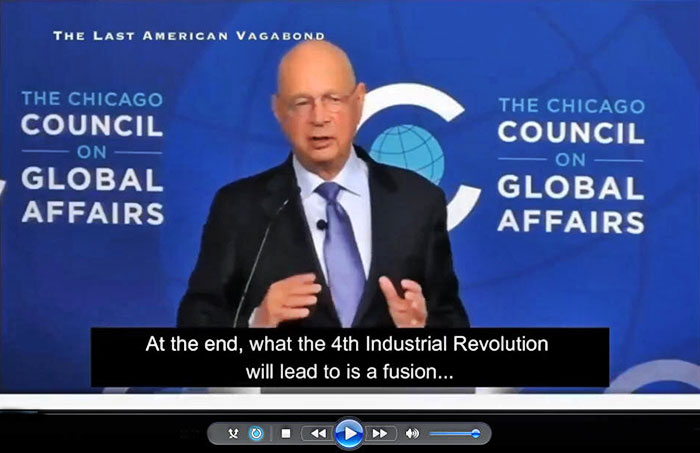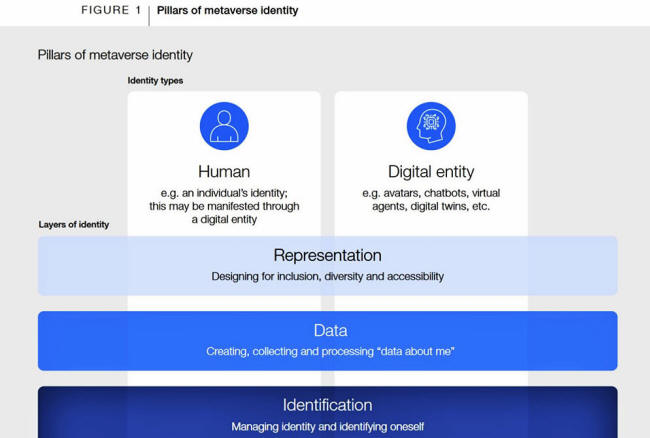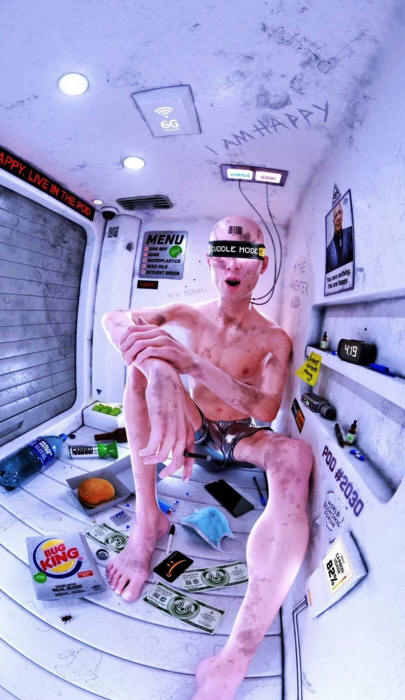|
from TheLastAmericanVagabond Website
Spanish version from the World Economic Forum outlines a vision of the blending of the physical world with the virtual metaverse dystopia, and claims digital identity
is a
necessary step in this direction...
On March 12, the World Economic Forum (WEF) released a new report titled, Metaverse Identity - Defining the Self in a Blended Reality which is ostensibly aimed at exploring the apparent need for a "metaverse identity".
The document, written in partnership with corporate firm Accenture, calls for,
The metaverse is a term that is commonly meant to describe the future of the internet, where digital and physical worlds intersect.
The WEF report features insights from 150 "global experts", including executives from,
Other contributors include representatives of,
The new report is building off an effort launched by the WEF in May 2022 known as the "Defining and Building the Metaverse" Initiative.
The WEF says this initiative is focused on an,
As is typical with WEF reports, this one is replete with the usual buzzwords about the need to build a metaverse that is,
The WEF also pays lip service to protecting privacy in the metaverse.
In regards to the metaverse, the WEF's version of equity and inclusion is about ensuring that each person has the opportunity to create a digital avatar as realistic or cartoonish as they prefer.
They claim that the key to redefining identity systems is,
However, when we take a closer look at the nature of this "blended reality" we can see that the WEF is describing the same future dystopian vision promoted by WEF Founder Klaus Schwab under the name the Fourth Industrial Revolution, or, more recently, The Great Reset.
In a section titled "A Story about Metaverse Identity - Page 8" the WEF offers a vision of one future:
While this sci-fi future may sound exciting and harmless, the reality is much darker.
As we have highlighted in previous reports on The Great Reset, the WEF has been promoting the idea of the 4th Industrial Revolution for years.
The 4IR was first announced in 2016 by WEF Founder and Chairman Klaus Schwab.
It is in this potential future that the WEF says we will all be using,
All of this would be powered by 5G and 6G networks.
Of course, what the WEF leaves out is that the creation of this alleged utopia will involve,
Not only does the WEF and their ilk assume that the people of the world want to live in a "blended reality", but the push towards this digitization and tokenization of the physical world is likely to have the effect of further separating humanity from our physical reality.
At one point the report acknowledges that,
It notes that research on DPDR has shown feelings of detachment in Virtual Reality (VR), with the technology blurring the lines between objective reality and virtual reality.
Without a hint of irony, the WEF report also suggests that pushing people further into the digital world with the creation of a metaverse identity is a,
The WEF says a metaverse identity,
...such as simple text-based chatbots to complex, human-like avatars and photo-realistic digital doppelgangers, or digital replicas.
The WEF claims that a,
Digital Identity is Central to the Metaverse Digital Dystopia
About half way through the report it becomes clear that at least one goal of the document is to further the push for digital identity programs.
The WEF report makes it clear that the virtual world is yet another area where the public can be encouraged to participate in digital ID systems and the overall digitization of humanity.
The WEF says a metaverse identity,
As we have extensively reported, there is a concerted effort to corral the world into digital ID systems by groups like,
These systems are promoted under the guise of helping the "unbanked" of the world, speeding up healthcare, protecting the environment, or simply as a means for entertainment and convenience.
However, the use of digital ID's stored in digital wallets with digital money controlled by governments or corporations will be the end of privacy as we know it.
The report also discusses what they call the,
The WEF claims this ID gap is an important reminder that as,
Still, although they appear to acknowledge that not everyone is going to be interested in a digital metaverse identity, the report notes that,
They also note that the choice to opt out of digital identities could,
This could be an admission that,
The WEF also notes that whether or not you want a metaverse identity, you may have already left behind a,
The WEF claims that because the metaverse is,
Inferred Data About Your Real Physical Life
The World Economic Forum also makes it clear that their vision of the metaverse identity is connected to an individual's actions in the physical world.
The report says metaverse identity will go beyond traditional ID, and extend,
The report notes that the way an individual speaks, including unique tonal inflexions or cultural idioms, or a person's,
The WEF says these attributes can generate what is known as "inferred data", which derives insights by using pattern recognition within data.
The WEF acknowledges that when combined with AI or machine learning this,
...to draw meaningful conclusions about a person's preferences, background and, even, intentions.
The report points out that a 2020 study suggests that five minutes of VR tracking data can produce,
It's not hard to imagine a situation where governments, corporations, or insurance companies pay for access to this "inferred data" only to use it against a citizen, client, or potential customer.
The report itself states that this data could be used to decipher a person's,
It states that governments might use inferred data for,
Further, the report says this,
The History of the Metaverse
The term metaverse was originally coined in the popular science fiction novel Snow Crash.
In Snow Crash, the main character, Hiro Protagonist, exists in a futuristic landscape where people hop in and out of the alternative universes made up of augmented reality and virtual reality.
While Snow Crash isn't the first or the only novel to imagine an alternative reality where humans use technology to interact with a virtual world and the physical world augmented with heads up displays, Snow Crash was the first one to use the term Metaverse.
From Snow Crash...:
Despite the utopian promises from the WEF and Meta (formerly Facebook) executives, there have been numerous critics of Meta CEO Mark Zuckerberg's plans to shift the public from actual reality to a simulated virtual reality.
Tom Valovic at CounterPunch described the Metaverse plans in the following way:
Valovic is correct in his estimation of the WEF vision...!
For the billionaire class and their puppet organizations, including the WEF and the United Nations, the Metaverse,
Of course, the potential for a digital virus to infect the hardware and software of the Metaverse - as well as the minds jacked in - is more than a little terrifying.
With the understanding of the true plans and intentions of those driving humanity towards the Metaverse, it's not hard to imagine a world which reflects something akin to the 2009 Hollywood film, Surrogates.
In the film, Bruce Willis plays an FBI agent investigating a death involving a surrogate, humanoid avatars that people choose to live in rather than their own bodies.
While in Surrogates the avatar is an alternative physical being, in the Metaverse the avatar is a digital being. Regardless, the end result is that most people choose to live in their Surrogates rather than in their real human bodies.
Is this what we will see with the Metaverse? Time will tell...
If the Technocrats have their way, we will have a physical world made up of smart cities where you will own nothing and be happy, with privacy and individuality a thing of the past.
The smart cities could potentially lock people in their homes and shutdown essential services during Climate Lockdowns or flare ups of the latest COVID variant.
Meanwhile,
With the people of the world safely tucked into their digital beds, the Technocrats could complete their total takeover of natural resources, the economy, and humanity itself...
|





